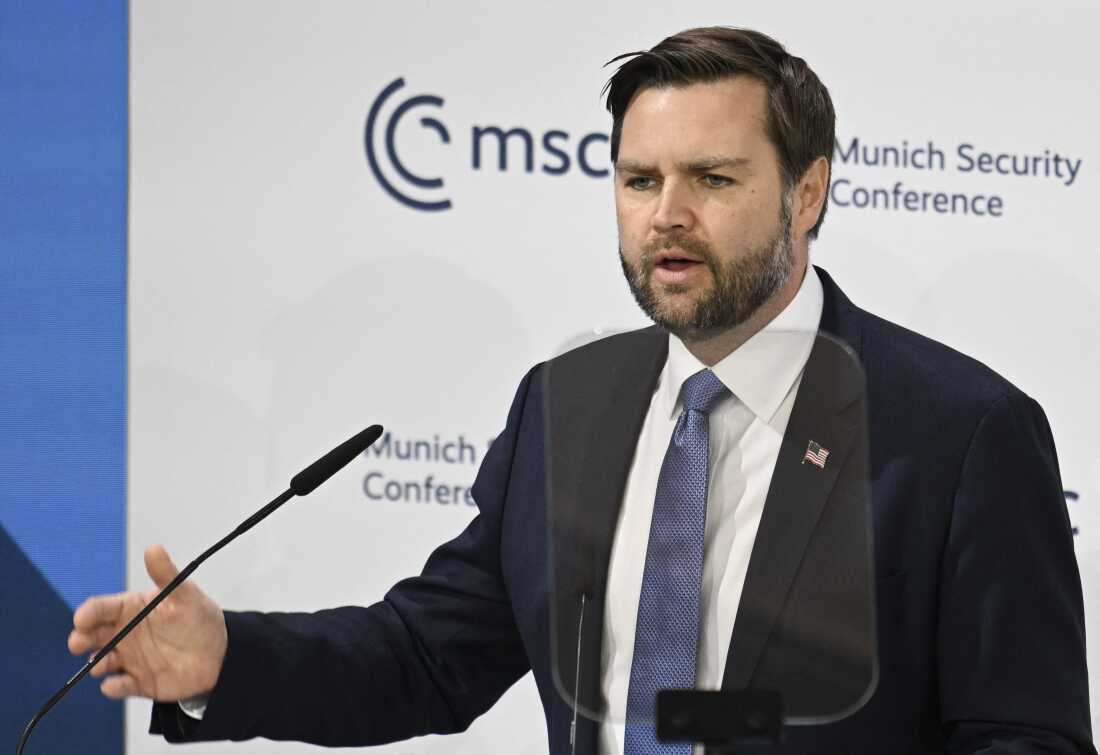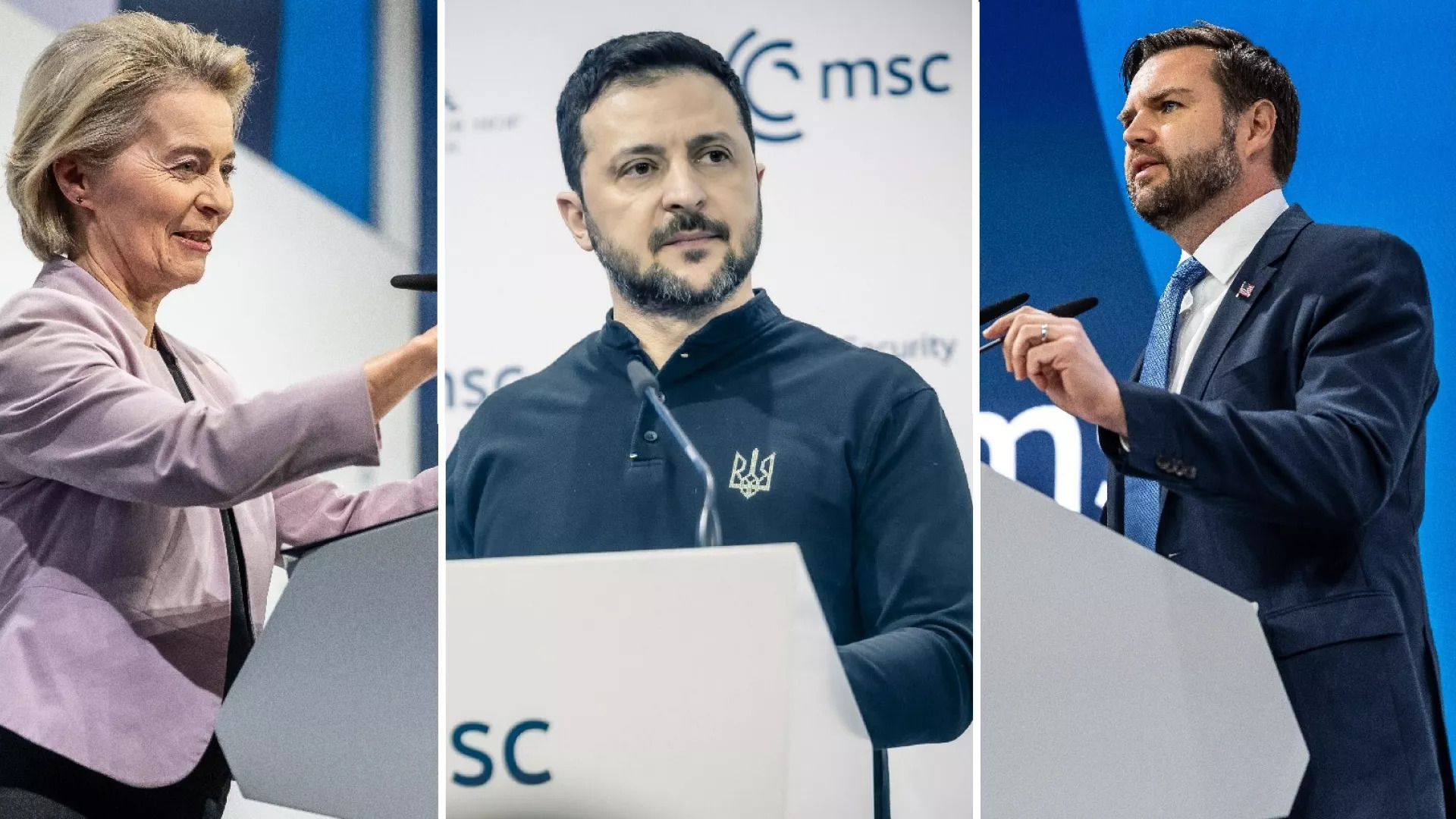
U.S. Vice President Vance speaks at the Munich Security Conference on Feb. 14, 2025. (Thomas Kienzle/AFP via Getty Images)
Recently, I had the privilege of participating in this year’s Munich Security Conference as a member of the Munich Young Leaders program. Throughout the conference, I keenly observed the growing transatlantic divergence in policy priorities. Whether in economic and trade affairs, military security or ideological and value-based discussions, the United States and Europe increasingly exhibit distinct positions and strategies. Particularly striking was U.S. Vice President JD Vance’s speech, which not only reaffirmed the Trump administration’s “America first” foreign policy approach but also provoked strong reactions from the European audience.
Vance’s speech barely touched on the pressing issue of the Ukraine crisis, instead focusing on the U.S. perspectives on security, democracy and freedom of speech. He remained firmly committed to the MAGA approach, framing his arguments around the narrow interests of the United States. Additionally, Vance suggested that Europe was backsliding in terms of democratic governance and free speech, portraying traditional alliances as an unfair burden on the U.S
Judging from the audience’s reaction, his speech did not receive enthusiastic applause; instead, it left many European delegates feeling disappointed and dissatisfied. Some privately remarked that the address seemed designed to bolster right-wing movements ahead of Germany’s upcoming elections, perhaps seeking to amplify the resonance between factions on both sides of the Atlantic.
The Ukraine crisis remains one of the most pressing challenges facing the U.S. and Europe. While Washington and Moscow may soon engage in a new round of negotiations, Europe has been left out of the conversation. From the U.S. perspective, pressuring Europe to accept its proposed peace plan is part of the broader strategy to put America’s narrow interests first. Meanwhile, Europe might insist that Ukraine’s sovereignty must be respected and demand that the U.S. provide sufficient and reliable security assurances not only for Ukraine but for the entire continent.
From a more pragmatic standpoint, the complexity of the Ukraine crisis lies in the multifaceted interests at play. The U.S. aims to swiftly resolve the conflict as a means to reset its relationship with Russia, while simultaneously reshaping transatlantic ties. Europe, on the other hand, must balance its commitment to regional security with the challenges posed by Washington’s transactional diplomacy.
Resolving the Ukraine issue requires time and patience. While the situation may not escalate in the short term, achieving a true reconciliation remains fraught with obstacles. If Washington and Moscow reach a certain level of consensus and allow European countries to take part in reshaping the regional security framework, the prospects for peace will significantly improve.
For the longer term, the Trump administration’s decreasing commitment to Europe is forcing the continent to reassess its traditional reliance on the U.S. In recent years, Washington has increasingly prioritized its own interests in foreign policy, scaling back strategic investments and security commitments in Europe. This trend presents growing strategic challenges for Europe. Many European delegates at Munich acknowledged that Europe remains dependent on the U.S. for defense in the short run. However, this reliance has also triggered a strong push within Europe for greater strategic autonomy.

Several European colleagues shared in private conversations that achieving true strategic autonomy requires Europe to gradually reduce its dependence on the U.S. and to enhance internal coordination and resource integration. A German expert stated unequivocally that even if Donald Trump manages to broker a peaceful resolution to the Ukraine crisis during his term, Europe will inevitably continue to increase its defense investments.
Some European scholars were even more pessimistic, telling me that the recent shifts in U.S. policy toward Europe are no longer just a wake-up call but constitute a slap in the face. Against this backdrop, Europe must not only advance its security capabilities but also find its own position in the evolving global landscape. As multipolarity gains momentum, Europe should strive to shape an independent and influential strategic identity.
In the economic sphere, Europe is also undergoing a deep reassessment of its “de-risking” policy. More and more major European companies are beginning to realize that their traditionally stable partner — the United States — is exhibiting behavior that increases uncertainty and introduces risks. Heavy reliance on the U.S. market and technology is proving inadequate to address future challenges. European businesses should actively explore ways to maintain their traditional trade and economic ties with the U.S. while simultaneously expanding engagement and cooperation with China. This not only helps spread out the risks but also could inject fresh momentum into the European economy.
Looking ahead, there are divergent views within Europe regarding the future trajectory of transatlantic relations. While the alliance remains intact, the Trump administration’s unilateralism and ideological criticisms have prompted some European nations to consider whether or not they should seek broader cooperation with China and other emerging powers, demonstrating that Europe is no mere subordinate to the United States.
Additionally, Europe is contemplating whether U.S. policy adjustments toward Europe will last beyond Trump’s second term. In other words, is Washington’s approach a tactical shift, or has there been a fundamental, strategic transformation in U.S. policy toward Europe?
Overall, the Munich Security Conference provided a crucial window into the current state of international affairs and transatlantic relations. The divisions between the U.S. and Europe in diplomatic principles and policy implementation were on full display: The U.S. remains committed to its America-first approach, viewing international relations through a transactional lens, while Europe, facing mounting pressure from Washington, is increasingly seeking strategic autonomy.
The Ukraine crisis, as the most pressing security challenge for both sides, has become a litmus test for whether or not the transatlantic partners can reach a consensus. Meanwhile, the gradual reduction of America’s strategic investment in Europe is accelerating Europe’s search for a new role in an increasingly multipolar world, making the pursuit of strategic autonomy an inevitable choice.